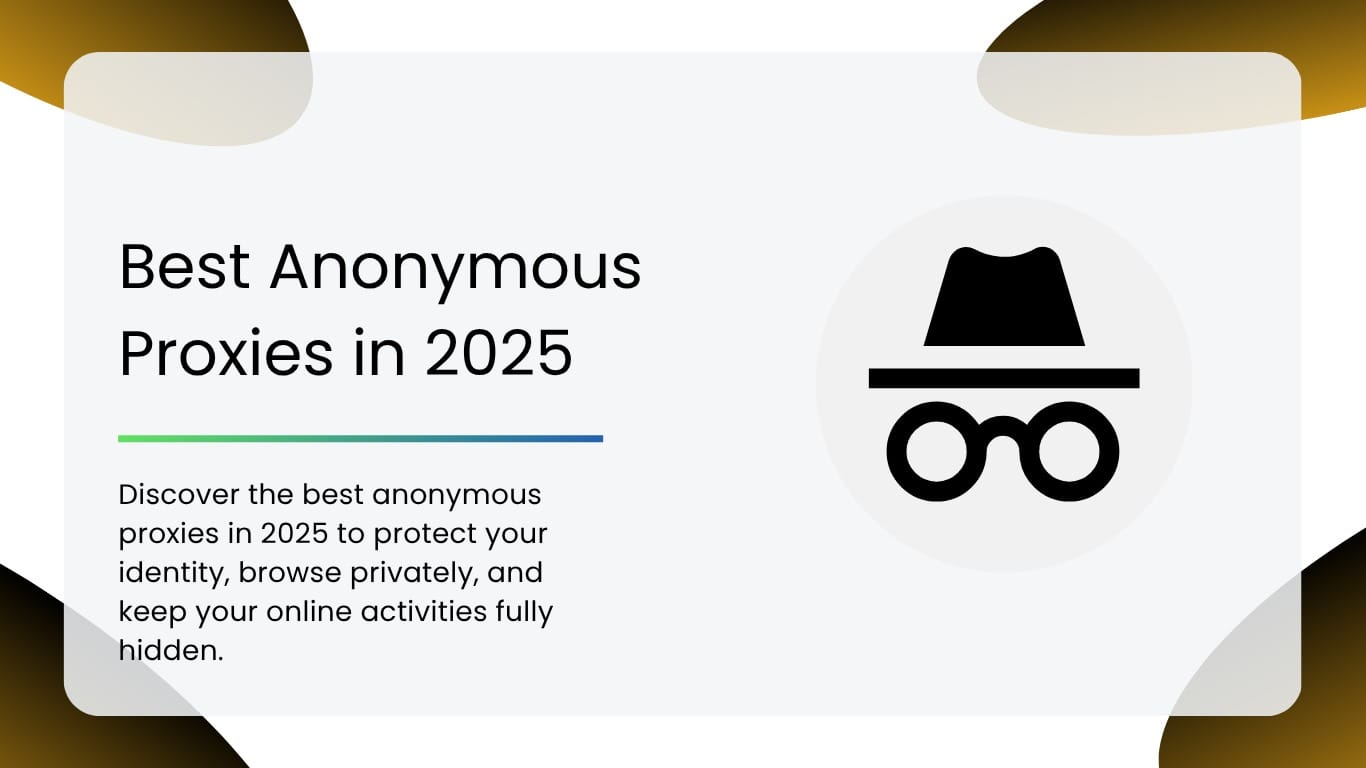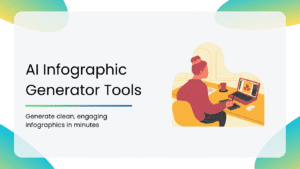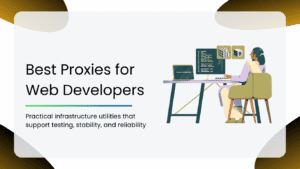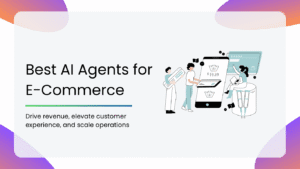As digital tracking becomes more pervasive, protecting online privacy is essential for many users.
Every website visit, search query, and online interaction can expose identity and location data to multiple parties, including advertisers, websites and even government agencies.
Anonymous proxies have become one of the primary tools to safeguard your privacy and bypass geographical restrictions on content. By routing internet traffic through an intermediary server, these proxies mask the user’s real IP address and create an additional layer of anonymity.
Understanding the technology behind anonymous proxies and recognizing their vital features empowers users to select useful solutions that truly protect their identity without sacrificing speed or accessibility.
What are Anonymous Proxies?
Anonymous proxies are intermediary servers that sit between a user’s device and the internet. When a user connects to a website via an anonymous proxy, the website sees the IP address of the proxy server instead of the user’s actual IP address. This prevents the user’s location and identity from being revealed.
Anonymous proxies not only provide privacy but also allow users to bypass online censorship, access region-locked content, and prevent tracking by third parties such as advertisers or internet service providers. They differ from other types of proxies by prioritizing user anonymity, often stripping identifying headers from web requests.
Key Features to Look for in an Anonymous Proxy
- No-Logs Policy for Privacy Protection: A strict no-logs policy ensures that the proxy provider does not store any information about user activity, connection times, or browsing history, preserving user anonymity fully.
- Delivering Fast & Stable Connections: High performance with fast speeds and reliable connectivity is essential to prevent interruptions during browsing, streaming, or downloads.
- Offering Location Choices Worldwide: The ability to switch between multiple proxy server locations globally enables bypassing geo-restrictions and accessing region-specific content easily.
- Encrypting Data for Secure Browsing: Strong encryption protocols protect data flow through the proxy, stopping interception or monitoring by ISPs or malicious actors.
- Providing Transparent & Trustworthy Services: Clear ownership information and transparent terms of use help users trust the service, ensuring the proxy is not involved in data misuse or shady practices.
Table of Contents
| 1. Bright Data |
| 2. Oxylabs |
| 3. Decodo |
| 4. NetNut |
| 5. Scraper API |
| 6. SOAX |
| 7. ProxyRack |
| 8. Webshare |
| 9. MarsProxies |
| 10. Outscraper |
Best Anonymous Proxies in 2025
1. Bright Data
Bright Data is a data collection and proxy platform aimed at both businesses and developers needing large-scale, reliable access to public web data. Originally starting as a premium proxy service, it now covers scraping infrastructure, ready datasets, and compliance automation. With more than 150 million IPs covering residential, datacenter, ISP, and mobile proxies, Bright Data powers everything from web scraping and SEO monitoring to ad verification and global market analysis.
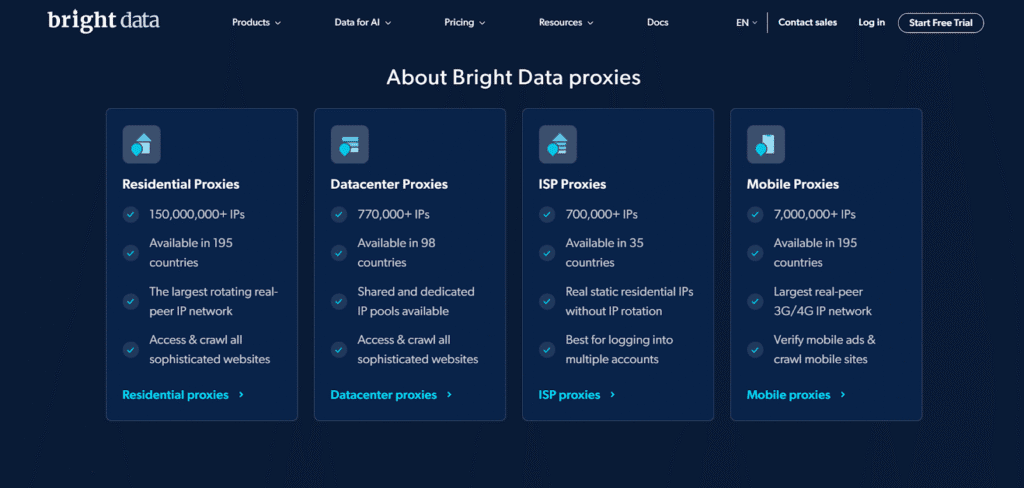
Key features
- Massive Proxy Network: Bright Data provides access to residential, mobile, datacenter, and ISP proxies from every continent.
- Automated Web Unlocking: Its Unblocker feature and scraping browser handle IP rotation, solving CAPTCHA, AJAX rendering, and anti-bot protection in the background.
- No-Code & API Tools for all: Bright Data has both no-code scraping tools and APIs or SDKs for developers, supporting automation, scheduled data pulls, and browser-based scraping.
- Consent-Based, Ethical Sourcing: All IPs, especially for residential proxies, are sourced with clear user consent. Built-in privacy and compliance controls make it suitable for regulated uses and enterprise-grade security needs.
- Flexible Usage & Detailed Controls: Customizable rotation, session stickiness, and geo-targeting let users fine-tune the way proxies are used on a per-project basis.
Pros
- Coverage spans 195 countries and enables city-level or IP/network-specific targeting for unmatched granularity.
- Built-in compliance engines, privacy management, and ethical IP sourcing minimize legal/business risks.
- Fast speeds, very high success rates, and tools for seamless scaling.
- Suitable for both technical and non-technical users.
Cons
- Among the highest-priced proxy services, it makes it better for corporate teams than individuals with small budgets.
- A deep feature set may overwhelm users who just want basic proxy access.
2. Oxylabs
Oxylabs is an enterprise-grade proxy platform focused on offering massive IP coverage and strong compliance. The network holds over 100 million IPs for scaling extraction, ad testing, and market research globally. The platform is built for businesses that demand reliability, GDPR-ready privacy, and resilient anti-ban technology.
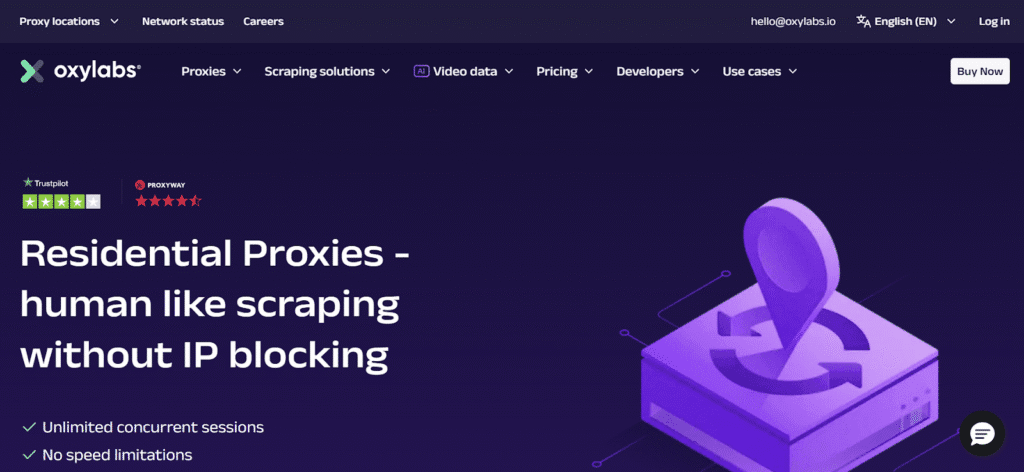
Key Features
- Enterprise-Scale Proxy Infrastructure: Large IP pool covers all proxy types to allow flexibility for teams doing multi-region or high-volume work.
- Strong Security & Compliance Focus: Oxylabs puts privacy and compliance at the center, with policies adapted to current legal standards and anti-abuse controls.
- Adaptive Rotation & Anti-Bot Measures: IPs can rotate automatically, and anti-bot algorithms are integrated to preserve access during heavy or aggressive tasks.
- Straightforward IP Management & Geo-Controls: Setup, monitoring, and geo-specific routing are handled easily, reducing operational effort.
Pros
- Reliable service for large projects.
- Simple but powerful dashboard delivers transparency in usage.
- Excellent customer support and documentation for business and technical teams.
Cons
- Pricing tailored for enterprise teams, not casual users.
- The range of controls and compliance features can be too complex if simpler proxy use is the goal.
- Not as cost-effective for personal or hobby purposes.
3. Decodo
Decodo targets users needing an easy, accessible introduction to proxies without dropping power or key site access. Its dashboard is streamlined, but the selection still covers residential, datacenter, and ISP proxies. Decodo balances price with consistency, letting users handle scraping and automation on a tight budget.
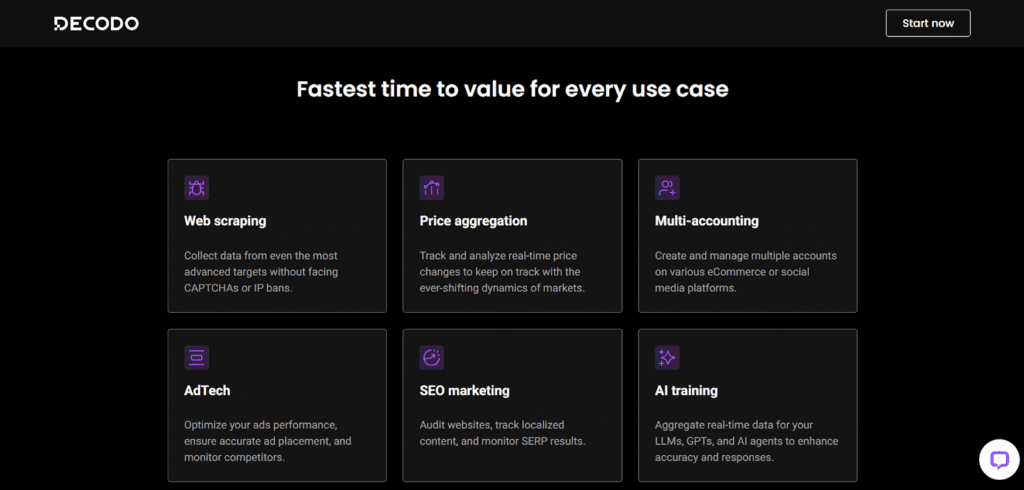
Key Features
- Simple & Intuitive Dashboard: Clear and uncluttered dashboard, guiding users through the setup and use of proxies.
- Auto-Rotation with Integrated Unblocker: All accounts benefit from automatic IP rotation, and a smart unblocker helps push past blocks set by anti-bot software.
- Ready Variety of Proxy Types: Proxies span residential, ISP, and datacenter sources, letting users customize their traffic for each website or project.
- Budget-Conscious Pricing: Flexible plans are available even for small projects, startups, or learners needing affordable but reliable proxies.
Pros
- Friendly to new users, with step-by-step setup.
- Reliable on most websites and has built-in features to deal with common anti-bot roadblocks.
- Lower prices and straightforward subscriptions make it accessible for more users.
Cons
- Not as many tools or advanced controls as the biggest proxy vendors.
- May fail against highly secured sites at a very high scale.
- Some technical limits on large workflows make it better for simple or medium setups.
4. NetNut
NetNut specializes in gateway proxies with direct ISP partnerships. The focus is on speed, massive concurrency, and handling bulk data jobs. The approach is ‘plug-and-go’ for those who know proxies, emphasizing session control and low-latency IP swaps for the highest efficiency.
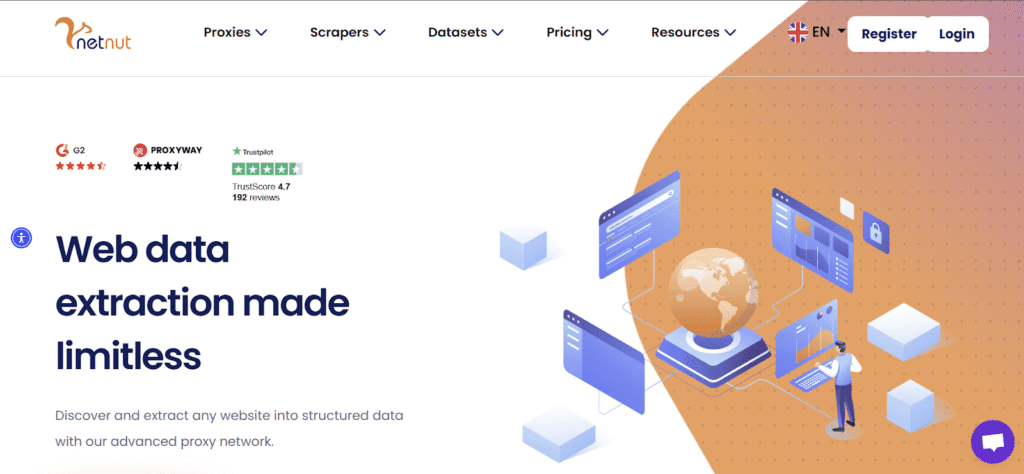
Key Features
- Gateway Proxy Model for Fast Access: Instant connections to static or rotating IPs through NetNut’s gateway.
- Unlimited Concurrent Sessions: Designed to handle many requests at once, making it useful for researchers, ad verifiers, and big scraping projects.
- Sticky & Rotating Sessions: Flexible setup for random or persistent IPs, supporting many scraping scenarios with little delay.
- Protocol & Security Options: Full support for HTTP, HTTPS, SOCKS5, plus IP whitelisting for controlled access.
Pros
- Designed for high-volume, high-speed tasks.
- Session management is flexible with either static or fast-rotating IPs.
- Setup is simple for advanced users, and power users get most of what they need with minimal steps.
Cons
- Not aimed at beginners, the dashboard and options require familiarity with proxy management.
- Some customizations, like highly-specific IP rotation timing, are limited.
- It’s overkill for simple needs and is ideal for heavy users only.
5. Scraper API
Scraper APi is built to automate web scraping by combining proxies, anti-blocking rules, and error handling. It acts as a unified interface where users can make API calls, and the Scraper APi manages proxy choice, rotation, and bypassing. It is well-suited for developers or teams that want to focus on data, not proxy management.
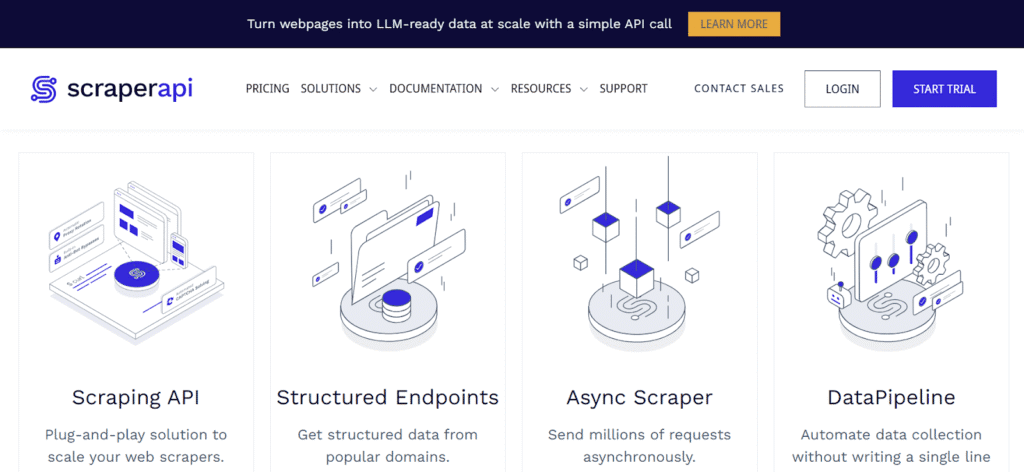
Key Features
- Automatic IP & Error Management: All proxies rotate automatically, with CAPTCHA and failures handled without user input.
- Broad Proxy Support & Built-In Tools: Includes residential, datacenter, and mobile proxies, all managed from one API or dashboard.
- Simple API Setup & Fixed Pricing: Clear pricing with no add-ons required for core use.
- Advanced Geotargeting: Supports city, country, or worldwide requests, letting users pull the right data for any market.
Pros
- Removes manual proxy handling and everything is automated behind a single API call.
- Handles CAPTCHA, retries, and blocks, increasing scraping reliability and ease of use.
- Suitable for those who want to extract data without proxy theory or directly.
Cons
- Fewer advanced customization options, so expert users might hit limits with deeper needs.
- Large projects or high-frequency campaigns can push up costs.
6. SOAX
SOAX operates as a flexible proxy provider with a vast, clean IP pool serving both residential and mobile proxies. Its offerings emphasize ethical sourcing, advanced geo-targeting, and steady performance for marketers, web scrapers, and privacy-focused users. SOAX targets reliability while keeping its tools accessible for medium to enterprise users.
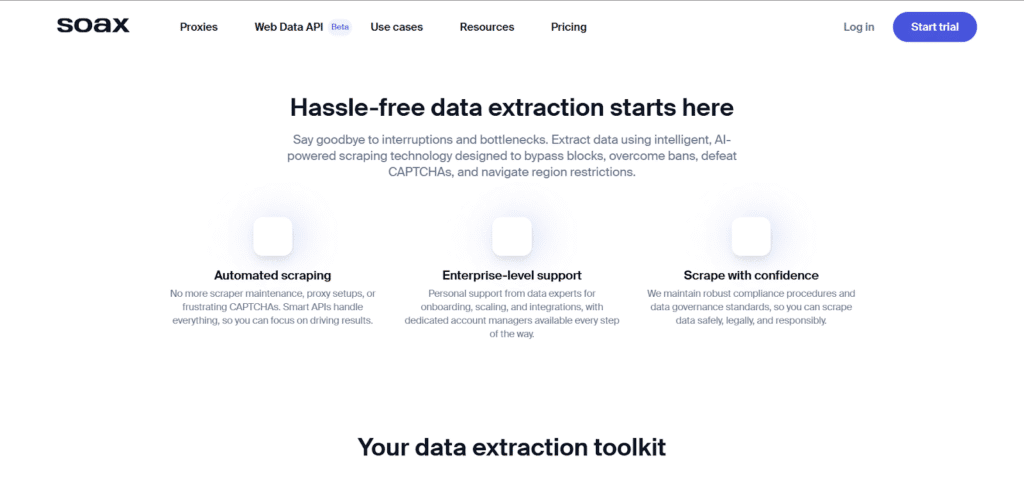
Key Features
- Vast Residential & Mobile Proxy Pool: SOAX provides access to more than 155 million residential and over 33 million mobile IPs globally, ensuring coverage in almost all countries and cities.
- Granular Targeting & Rotation: Offers city, country, ASN, and ISP-level targeting along with customizable session length and IP rotation.
- API & Dashboard Control: Intuitive dashboard gives real-time control over endpoints, refreshing ports, session monitoring, and usage.
- Strict KYC & Ethics: SOAX runs KYC checks for most plans and pre-approves usage for ethical cases, minimizing risk and abuse.
Pros
- Excellent global coverage lets users target even small regions.
- Pay-as-you-go and flexible plans make the entry cost low.
- Responsive 24/7 live support for troubleshooting.
- Fast connections and a high success rate with niche anti-bot target sites.
Cons
- Limited free tools for in-depth proxy management.
- No monthly flat rate per IP; billing is by bandwidth.
- Some platform restrictions and learning for API newcomers.
7. ProxyRack
ProxyRack offers affordable proxies and VPNs, catering to users who want variety and unlimited connections more than sheer volume. The service gives access to both residential and datacenter proxies, as well as SOCKS5, HTTP, and HTTPS protocols, balancing privacy and automation features for small businesses and tech enthusiasts.
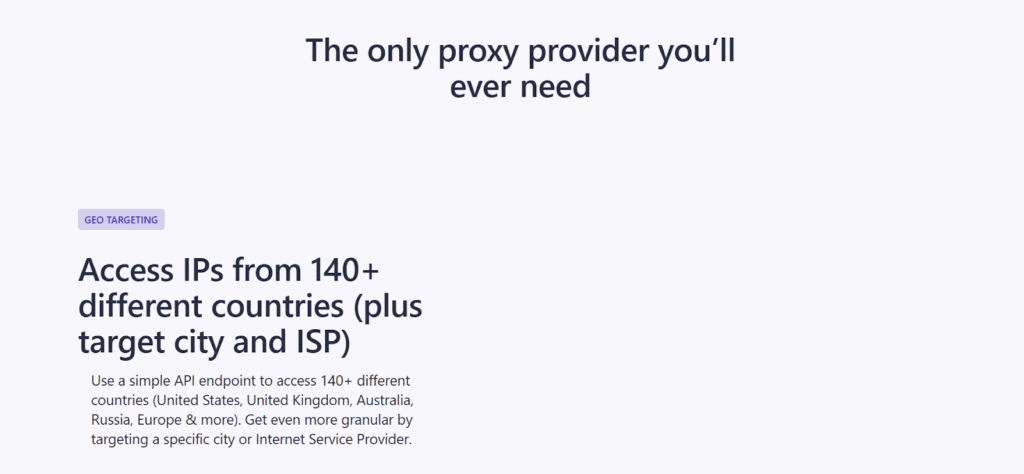
Key Features
- Mixed Residential & Datacenter Networks: ProxyRack covers over five million residential IPs and tens of thousands of datacenter IPs, with significant country reach and rotation options.
- Unlimited Bandwidth & Threads: Many ProxyRack plans allow for unlimited concurrent connections and bandwidth, letting users scale scraping jobs with ease.
- SOCKS5 & API Access: Supports advanced protocols and API integration, including Docker-ready deployments for quick scaling.
- Multiple Authentication Methods: Allows both IP authentication and username/password combos for easier integration with custom tools.
Pros
- Cost-effective, especially for high-volume users or teams needing lots of connections.
- Wide protocol support.
- Docker and advanced automation support for modern development stacks.
Cons
- Proxy pool is smaller than some high-end rivals, with less fine-tuned geo-targeting.
- SOCKS5 is limited to data center proxies only.
- Available countries sometimes fluctuate, which can affect consistency for targeted access.
8. Webshare
Webshare delivers affordable, high-speed proxies to individuals and companies, focusing on privacy, automation, and broad accessibility. It is well-regarded for entry-level and moderate business use, offering datacenter, residential, and ISP proxy types with a simple, scalable platform.
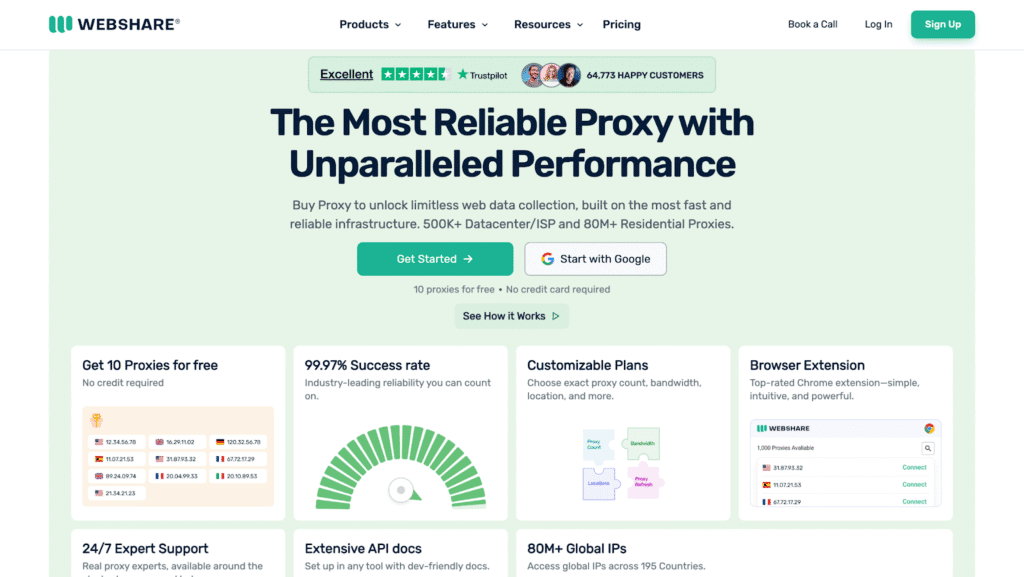
Key Features
- Diverse Proxy Types with Solid Anonymity: Webshare providers datacenter, residential, and ISP proxies with fast rotation and session control, letting users fit proxies to many scraping and management needs.
- High-Speed and Reliable Uptime: Optimized for consistent availability, with robust infrastructure and minimal downtime.
- User-Friendly and Transparent Management: A clear dashboard and API make it easy for anyone to generate, monitor, and automate proxies.
- Affordable, Flexible Pricing: Low entry plans and bulk discounts allow both solo users and companies to minimize costs.
Pros
- Enhanced privacy and transparent business practices.
- Dependable for scraping, with high success rates versus bans.
- Allows seamless geo-unblocking for accessing regional content.
- Cost-efficient for growing projects or small-scale use.
Cons
- Proxy pool is smaller compared to top-tier competitors, especially for niche geo-targets.
- Power users may find advanced features or custom options lacking.
9. MarsProxies
MarsProxies focuses on premium proxies for end-users and SMEs, providing a large range of residential, datacenter, ISP, and sneaker proxies in one clean interface. Their approach emphasizes ethical sourcing, high reliability, and creative geo-targeting for modern automation and research.
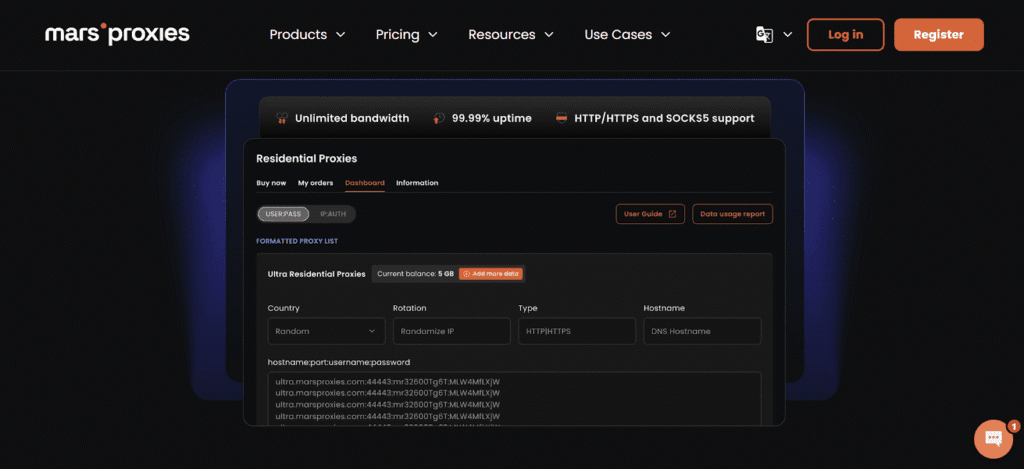
Key Features
- Global Proxy Network: With over one million IPs across 190+ countries, MarsProxies ensures extensive coverage and ready geo-targeting for every proxy type.
- Speed and Security: Proxies are optimized for low latency, fast data transfer, and secure encryption, including SOCKS5 and HTTPS support.
- Free Targeting at State/City Level: Geo-targeting at granular levels has no extra fees, appealing to users who need precise locality.
- Elite Privacy Controls: Elite/high-anonymity proxies, double authentication, and IP whitelisting enhance data and access security.
Pros
- An Easy and user-friendly dashboard is accessible to beginners and pros.
- Bulk buy and discounted plans make it cost-friendly for businesses.
- Reliable uptime and high-speed for all proxy types.
Cons
- Proxy pool size is less compared to the biggest providers.
- Tough anti-bot targets may require advanced tuning.
- Advanced enterprise controls are limited for the largest organizations.
10. Outscraper
Outscraper is a cloud-focused data platform renowned for scraping public sources like Google Maps and Search at scale. Its core strengths lie in customizable scraping templates, cloud-powered scale, and advanced lead generation with built-in proxy management. It is a popular option for teams that want results without managing proxy logistics.
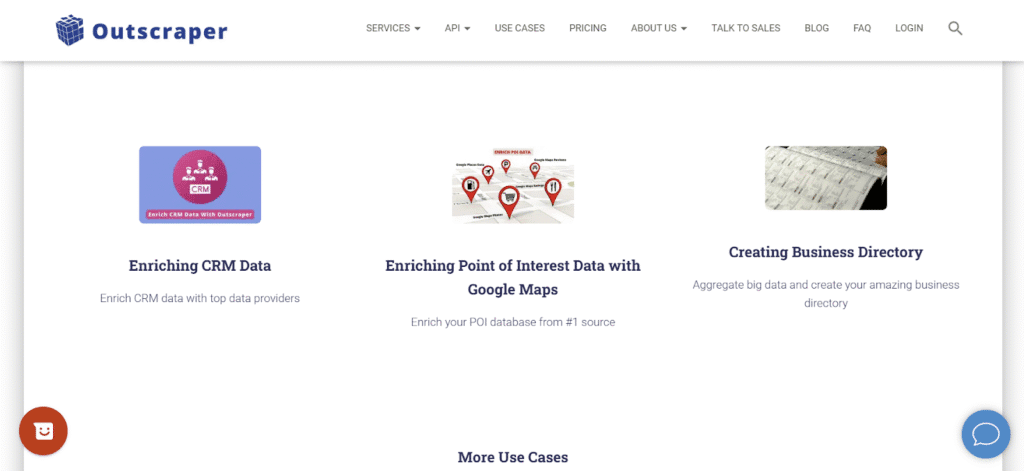
Key Features
- Advanced Proxy and Scraping Automation: Outscraper routes requests through its managed rotating proxy pool, dealing with bans and ensuring consistent data pulls.
- Scalable, Reliable Cloud Infrastructure: Jobs run on scalable servers designed for fast turnaround and high-volume processing with built-in retry logic.
- Rich Data Enrichment and Filtering: Offers deep filtering, real-time monitoring, and cleaning of leads pulled from big public sources.
- Easy, Visual Data Selection: Visual UI lets users define targets and scraping rules without learning code, speeding up onboarding.
Pros
- Zero proxy management headaches, everything is handled by Outscraper.
- Fast turnarounds for both small and large datasets, with strong support response.
- Pre-built scraping templates accelerate setup for business users.
Cons
- Best features locked to public data (Google, search engines, reviews), not a generic all-browser proxy.
- Large scraping tasks may hit scaling costs.
- Reliant on Outscraper’s system for stability and compliance, limiting customization.
Conclusion
Finding the right proxy means looking beyond just the list. Some projects call for extra privacy settings and big IP pools, while others do fine with a basic dashboard and a smaller network.
Think about what kind of data gets handled, how many connections need support, and how hard setup should feel. Budget should fit the plan, but also check if the support is any good and if the service explains its privacy rules in clear language.
A good match lets the job run smoothly, gives control when needed, and keeps everything secure without too much hassle. Pick what answers the real use case, not just what looks best on paper.
Check out our other blogs for more such informative content:
- Best Proxy Manager Platforms in 2025
- Best Datacenter Proxies in 2025
- Top Web Scraping Proxies in 2025
FAQs
A proxy service acts as an intermediary between your device and the internet. When you use it, your internet requests go through the proxy server first, which forwards them and hides your real IP address. This helps protect your privacy, bypass restrictions, or manage multiple connections.
There are several types, including residential, datacenter, mobile, and ISP proxies. Residential proxies use IPs assigned to real home users, which helps avoid blocks. Datacenter proxies are fast but easier to detect. Mobile and ISP proxies provide added anonymity and stability. Choice depends on your project’s needs for privacy, speed, and reliability.
Proxy rotation means changing the IP address automatically to avoid detection or bans, ideal for scraping or accessing multiple accounts. Session control lets you keep the same IP for a set time to maintain stable connections. Proper use reduces blocks and improves success rates for automated tasks.
Free proxies are often slower, less secure, and more prone to downtime or misuse. Paid proxies offer better speed, support, privacy policies, and reliability essential for professional or large-scale use. Investing in a paid service generally delivers more consistent and secure performance.
Disclosure – This post contains some sponsored links and some affiliate links, and we may earn a commission when you click on the links, at no additional cost to you.

